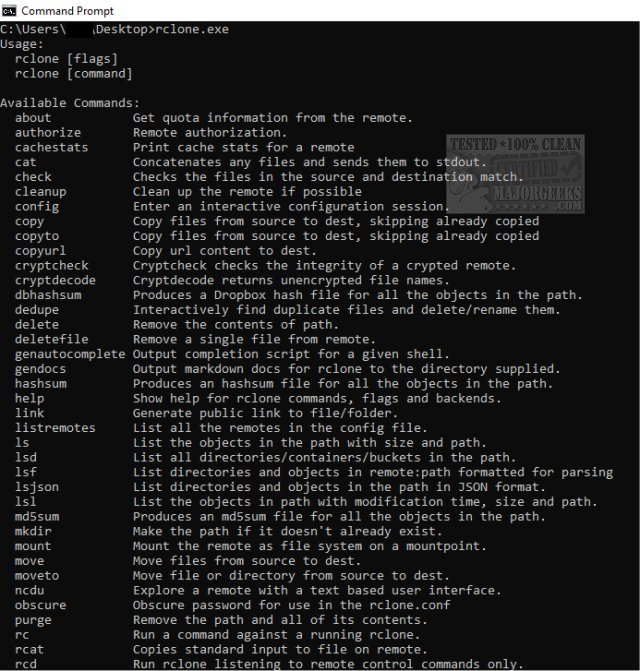Rclone version 1.69.3 has been released, enhancing its capabilities as a command-line tool for synchronizing files and directories between various cloud storage services and local file systems. This versatile program serves as a robust alternative to the web interfaces provided by cloud vendors, enabling users to efficiently transfer, synchronize, and back up files across popular platforms such as Google Drive, Dropbox, and Amazon S3.
Rclone supports over 70 cloud storage products, including S3 object stores, consumer file storage services, and standard transfer protocols. It replicates functionalities similar to traditional Unix commands, such as rsync for synchronization, cp for copying files, and mv for moving files, among others. The tool's user-friendly syntax allows seamless integration with shell pipelines, facilitating efficient file processing.
One of Rclone's standout features is its dry-run option, which allows users to preview changes before executing them, thereby enhancing safety during file operations. Rclone can be run directly from the command line, incorporated into automated scripts, or accessed via its robust API, making it ideal for both casual users and developers.
The latest version continues to support a wide array of services, including 1Fichier, Alibaba Cloud OSS, Amazon Drive, Backblaze B2, Box, DigitalOcean Spaces, Microsoft Azure Blob Storage, and many more. Rclone also ensures file integrity through constant MD5/SHA1 hash checks and preserves timestamps. It supports partial syncs, copy modes for new or changed files, and can sync between different cloud accounts.
In addition to its core features, Rclone offers encryption, caching, chunking, and a union backend, along with optional FUSE mounts. Multi-threaded downloads, serving files over HTTP/WebDav/FTP/SFTP, and experimental web-based GUIs further enhance its functionality.
Overall, with its extensive feature set and broad compatibility with numerous cloud services, Rclone remains an invaluable tool for users looking to optimize their cloud storage management.
Extension:
As cloud storage continues to evolve, the importance of efficient file management tools like Rclone cannot be overstated. With increasing data volumes and the need for seamless integration across different platforms, Rclone's role is likely to expand. Future updates may include improved user interfaces, enhanced automation features, and greater support for emerging cloud services. Additionally, as security concerns grow, Rclone's encryption capabilities will become even more critical. Users can expect ongoing enhancements that not only simplify the process of file synchronization and management but also address the growing complexities of data governance and compliance across diverse cloud ecosystems
Rclone supports over 70 cloud storage products, including S3 object stores, consumer file storage services, and standard transfer protocols. It replicates functionalities similar to traditional Unix commands, such as rsync for synchronization, cp for copying files, and mv for moving files, among others. The tool's user-friendly syntax allows seamless integration with shell pipelines, facilitating efficient file processing.
One of Rclone's standout features is its dry-run option, which allows users to preview changes before executing them, thereby enhancing safety during file operations. Rclone can be run directly from the command line, incorporated into automated scripts, or accessed via its robust API, making it ideal for both casual users and developers.
The latest version continues to support a wide array of services, including 1Fichier, Alibaba Cloud OSS, Amazon Drive, Backblaze B2, Box, DigitalOcean Spaces, Microsoft Azure Blob Storage, and many more. Rclone also ensures file integrity through constant MD5/SHA1 hash checks and preserves timestamps. It supports partial syncs, copy modes for new or changed files, and can sync between different cloud accounts.
In addition to its core features, Rclone offers encryption, caching, chunking, and a union backend, along with optional FUSE mounts. Multi-threaded downloads, serving files over HTTP/WebDav/FTP/SFTP, and experimental web-based GUIs further enhance its functionality.
Overall, with its extensive feature set and broad compatibility with numerous cloud services, Rclone remains an invaluable tool for users looking to optimize their cloud storage management.
Extension:
As cloud storage continues to evolve, the importance of efficient file management tools like Rclone cannot be overstated. With increasing data volumes and the need for seamless integration across different platforms, Rclone's role is likely to expand. Future updates may include improved user interfaces, enhanced automation features, and greater support for emerging cloud services. Additionally, as security concerns grow, Rclone's encryption capabilities will become even more critical. Users can expect ongoing enhancements that not only simplify the process of file synchronization and management but also address the growing complexities of data governance and compliance across diverse cloud ecosystems
Rclone 1.69.3 released
Rclone is a powerful Command Line tool designed for synchronizing files and directories between a wide range of cloud storage services and local file systems.


